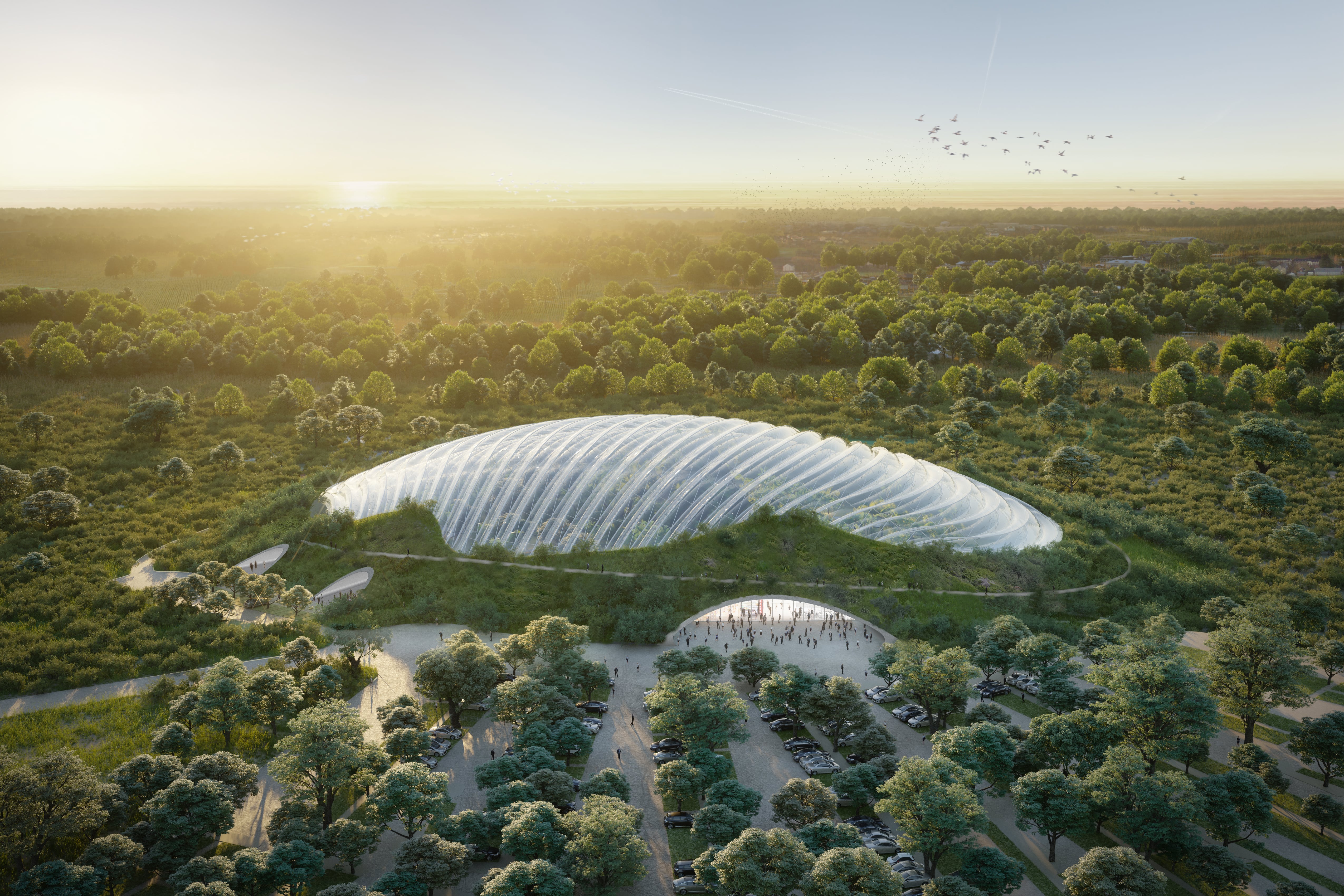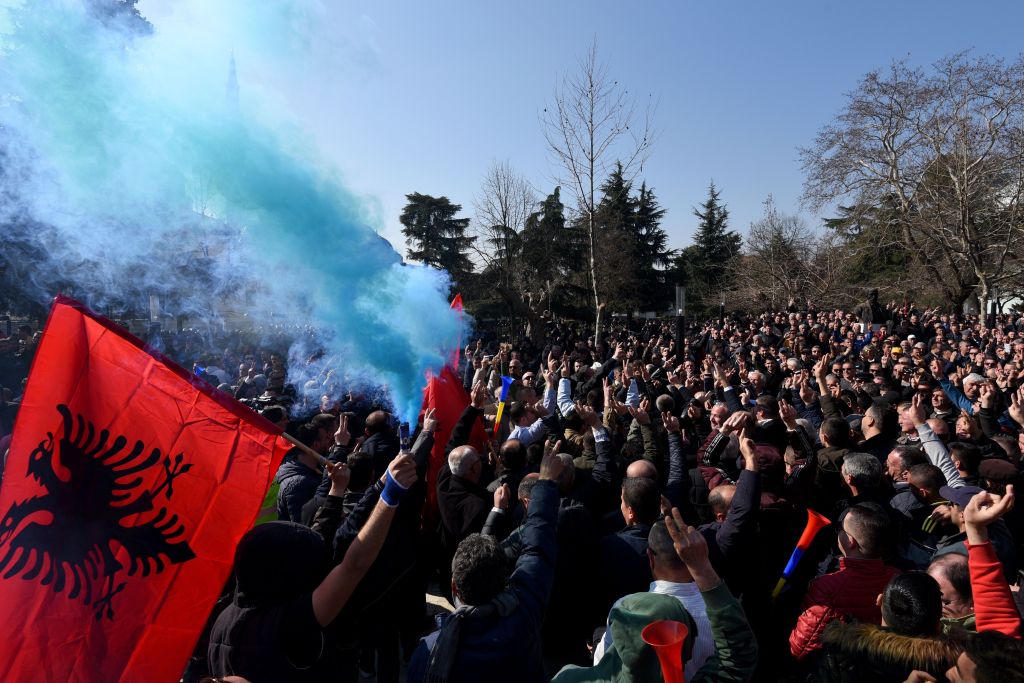RANG-DU-FLIERS, France – The grey, wind-swept surrounds of Rang-du-Fliers, an unremarkable village in northern France whose tourist office proudly boasts its proximity to an annual kite festival, do not immediately provoke thoughts of the vibrant Amazon rainforest.
But a controversial €72 million (about £63 million) project, unveiled to great pomp in 2018 and planned to begin construction later this year, is set to assemble the largest single-domed tropical greenhouse in the world on a patch of desolate land near to the local hospital.
Videos by VICE
Named “Tropicalia”, the gigantic 20,000 square-metre plastic dome structure will house a 25-metre-high waterfall, a one-kilometre-long walking trail and an Olympic-sized pool filled with Amazonian fish, many rare species of amphibians, birds, reptiles, as well as an auditorium, a restaurant, and a bed and breakfast for guests.

Yet the tropical flora and fauna flown in from around the world, including weekly planes from Africa and South America bringing more species to replenish the stock of 8,000 butterflies, will need protection from the winter frost of the north.
Developers claim the dome’s double protective layer of ethylene tetrafluoroethylene – a resistant and transparent plastic – and innovative heat recycling technology will help maintain temperatures inside at between 26C and 28C all year round.
Dreamt up by Cédric Guérin, a veterinarian who spent his childhood French Guiana and equatorial Africa, the project will supposedly give a shot in the arm to France’s dreary region promoted as the “Opal Coast” – and hopes to draw in 500,000 visitors per year.
“My childhood experiences gave me the inspiration for this,” Guérin told VICE World News. “But Tropicalia is a combination of my professional experience and personal passion. I want to share this experience with others.”
However, a coalition of 38 conservation groups including Greenpeace and Extinction Rebellion, has raised serious concerns over this self-styled “Garden of Eden” project as the efforts against the climate crisis become more and more crucial.

They say that Tropicalia – whose promotional materials promise an “immersive experience” that will be “an open door to understanding and respecting a fragile ecosystem” and “part of the fight against global warming” – is an absurd vanity project that harks back to colonial times.
Earlier this month hundreds of protestors gathered in Rang-du-Fliers under the banner of the Non à Tropicalia collective, waving technicolour flags, singing defiant chants and brandishing posters proclaiming “the tropics are here” on a map pointing to rainforests around the world – with northern France notably absent.
“Why on earth are we trying to bring Brazil to northern France?” said Clementine Daveau of activist group Extinction Rebellion Calais. “We’re facing a climate crisis. We’ve seen that climate change is accelerating. But they want to bring plane loads of butterflies, create lots of traffic, meanwhile creating all these emissions.”
The ecologist mayor of Grenoble, Eric Piolle, and Ugo Bernalicis, an MP for the left-wing La France Insoumise party, were among those protesting. “I’m opposed to the project,” Bernalicis told VICE World News. “It’s an aberration. It belongs in the past. It’s against everything in the climate crisis, politically and ecologically.”
Theo, a 23-year-old student from Lille, believes the motives behind Tropicalia are essentially an ego trip. “This guy just wants to brag about the fact that he has travelled around the world to those who haven’t had the opportunity,” he said. “It’s an absurd project. We need to focus on localism.”

Others argue there is a much more traditional explanation: money. “It’s a private project with an economic objective,” said Xavier Hermant of Greenpeace Lille. “They want to make profit. That is the bottom line.”
Out of a €72.2 million provisional budget, Tropicalia will receive €12.4 million of public funding through the Ecological Transition Agency, the European Regional Development Fund and the local municipality. Anonymous private investors have stumped up €14 million and €45.8 million will be borrowed from BFIN, an investment bank based in Canada. VICE World News can reveal BFIN has shell companies in the British Virgin Islands and that the company’s UK subsidiary, BFIN Real Estate, registered losses in 2018 and 2019 and paid no tax in 2019. It did not respond to a request for comment.
Guérin declined to provide information on investors, noting in an emailed statement: “With regard to our financial partners, we no longer wish to communicate because of the relentlessness of our detractors towards all of our supporters.”
But defending the economic benefits of the project, Guérin said that it will be “possible to reimburse the initial investment” if there is an average of at least 420,000 visitors, more than 1,000 per day. Tropicalia should, he added, at the same time create 145 jobs for the local economy (though activists claim the real figure would be 50 jobs).
Claude Coin, the mayor of Rang-du-Fliers, who granted the venture a building permit, continues to back Tropicalia. “The project will be good for the area economically,” he said. “We want tourists to be drawn into the area for days.”
Developers obtained a permit at the end of 2019, but a legal appeal was filed at the administrative courts by local environmental campaign group GDEAM62 in March 2020. A hearing should be held by the end of the summer, according to Coin.
GDEAM62’s appeal, which not yet received a response from Tropicalia, centres on allegations that there was not a proper public consultation held over the plans, that a hotel was introduced into the plans after a building permit was awarded, and that the project will not be self-sufficient in terms of heating, as claimed.
“We want the total abandonment of the project,” said Mariette Van Brugghe, president of GDEAM62. “We can’t continue to destroy mother nature.”
But whether the appeal is upheld or not, criticisms of Tropicalia are wide-ranging: the outdated captivity format of zoos, the unnecessary carbon footprint in constructing the project, the amount of water use (an estimated 25,000 cubic metres of water per year) and the region’s already high development of land – Nord Pas-de-Calais’ urbanisation rate is almost twice as high as the national average. The Hauts-de-France Region and the Prefecture of Pas-de-Calais did not respond to requests for comment.
Even then, questions have been raised over the long-term economic benefit that Tropicalia could bring to locals. André Letendaart, a local resident, said that the jobs created will be precarious and seasonal labour. “The pandemic has shown we can’t rely on tourism,” he said. “I don’t believe these jobs will last. We need more resilient forms of employment.”
For Guérin, these criticisms don’t hold up and opponents of Tropicalia are in his words “ecologist ayatollahs” that oppose any form of development.
“They want decroissance,” he said, referring to a popular theory in France that asserts constant economic growth is not necessarily good for society – and that social and ecological well being should be prioritised over corporate profits. “They are afraid of capitalistic projects. But we are looking to the future for solutions.”
When asked what the carbon footprint of the project will be, Guérin told VICE World News calculations were still ongoing. “It’s very, very difficult to estimate the carbon emissions,” he said. “It’s very complex and it takes time. We will publish them as soon as possible, but I don’t want to give a precise date.”
Until then, campaigners say that efforts to bring the tropics to northern France are inching ever-closer to reality and that Tropicalia’s realisation will contribute to the rapid destruction of the rainforests across the world that it proposes to replicate.







